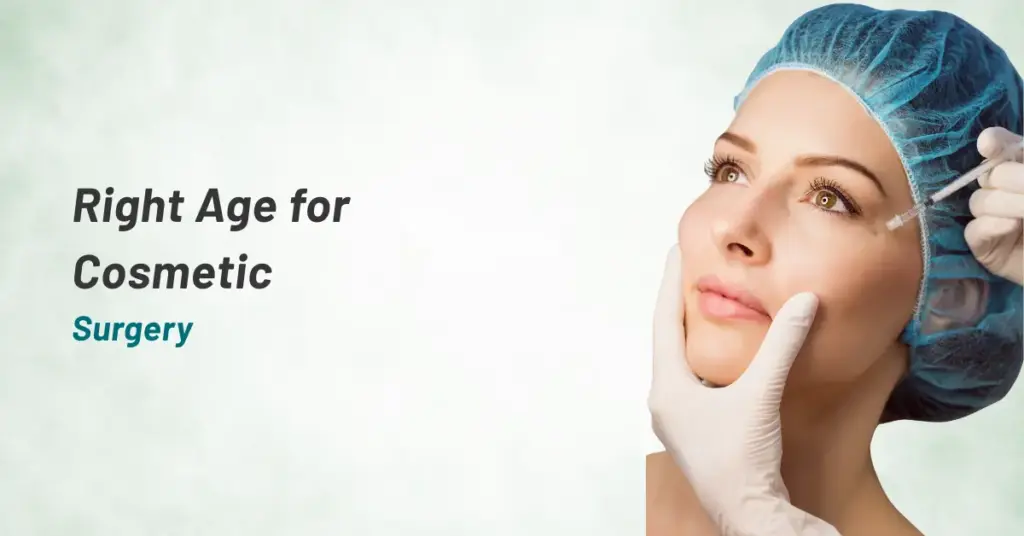Cosmetic surgery is no longer just for celebrities or the wealthy — it has become a widely accepted way for people to enhance their appearance and boost self-confidence. But an important question remains: what’s the right age for cosmetic surgery?
The truth is, there’s no universal answer. The right age depends on your goals, health, emotional maturity, and the specific procedure you’re considering. This guide will help you understand when to consider cosmetic surgery, what’s considered age-appropriate cosmetic surgery, and what factors to think about before making your decision.
Why Age Matters in Cosmetic Surgery
Your body changes over time, and so do your motivations for improving your appearance. Choosing the right age for cosmetic surgery is about more than just numbers — it’s about ensuring that your body has developed enough for the procedure to be effective, and that you’re emotionally ready to handle the process and the results.
Plastic surgeons always evaluate a patient’s health, lifestyle, and expectations alongside their age to recommend safe, realistic options.
Minimum Age for Cosmetic Surgery
Many procedures are not performed on patients under 18, unless there is a strong medical or psychological reason, like correcting a birth defect or repairing trauma.
For elective cosmetic procedures — done purely for appearance — most surgeons recommend waiting until:
- You’ve completed physical growth
- You can make informed decisions about risks and benefits
- You have realistic expectations about the outcome
This is especially true for procedures like breast augmentation, rhinoplasty (nose reshaping), and liposuction, where waiting for full physical development produces better, longer-lasting results.
Cosmetic Procedures by Age Group
Let’s take a closer look at some age-appropriate cosmetic surgery options for different life stages.
Teens (16–19 years)
Teenagers occasionally seek cosmetic procedures to correct features that cause social anxiety or self-esteem issues. The most common procedures in this group include:
- Rhinoplasty (after facial growth is complete, usually by 16–17 for girls, 17–18 for boys)
- Otoplasty (ear pinning, which can be done as early as 5–7 years, but many teens choose it)
- Scar revision for acne or injury
For teens, emotional maturity is key. Surgeons often assess whether the desire for surgery comes from personal motivation rather than peer or parental pressure.
Young Adults (20s–30s)
This is the most popular age group for cosmetic enhancements, as people begin to refine their appearance while enjoying good overall health. Common procedures include:
- Breast augmentation or reduction
- Liposuction or body contouring
- Rhinoplasty or chin augmentation
- Minimally invasive options like Botox and dermal fillers
At this stage, patients have fully developed physically and are usually more prepared to handle the recovery and long-term commitment of cosmetic surgery.
Middle Age (40s–50s)
As signs of aging begin to appear, many patients turn to cosmetic surgery for rejuvenation. Procedures commonly sought at this stage include:
- Facelifts or neck lifts
- Eyelid surgery (blepharoplasty)
- Brow lifts
- Laser skin resurfacing or chemical peels
These procedures help reduce wrinkles, sagging, and other age-related changes. By now, people have a clear understanding of when to consider cosmetic surgery for maintaining a youthful look.
Seniors (60+)
Even in later years, many people opt for cosmetic surgery to look as young as they feel. While advanced age isn’t necessarily a barrier, overall health becomes even more important. Safe, targeted procedures include:
- Facelifts
- Eyelid surgery
- Skin tightening treatments
- Injectable fillers for fine lines
Doctors will carefully evaluate older patients for surgical risks and discuss realistic outcomes before proceeding.
Factors to Consider Before Cosmetic Surgery
When thinking about the right age for cosmetic surgery, it’s not just about how old you are — it’s about how ready you are. Before deciding, consider:
- Physical Readiness – Has your body fully developed for the procedure?
- Health Status – Are you healthy enough to undergo surgery and recover well
- Emotional Maturity – Do you have realistic expectations and a positive outlook?
- Motivation – Are you doing this for yourself, not to please others?
- Lifestyle – Will you be able to maintain the results with healthy habits?
Discuss these factors thoroughly with your surgeon to determine the safest and most appropriate timing.
Safe Cosmetic Surgery Timing: No Rush
While it can be tempting to jump into cosmetic surgery at the first sign of dissatisfaction, remember: it’s a personal journey. There’s no “perfect” age, only the right age for you.
Minimally invasive treatments — like Botox, fillers, or laser therapies — can be started earlier as maintenance or to delay more invasive surgery. Surgical procedures, however, should wait until you’re physically and emotionally ready.
Final Thoughts
So, what’s the right age for cosmetic surgery? It varies from person to person. Teenagers may seek procedures to correct prominent features, young adults often enhance their bodies, middle-aged patients focus on rejuvenation, and seniors aim to maintain a youthful appearance.
The key is to ensure your decision is informed, realistic, and made for the right reasons. Work closely with a qualified, board-certified plastic surgeon who can guide you on when to consider cosmetic surgery and what’s best for your health and goals.
Cosmetic surgery is not just about looking younger — it’s about feeling confident and comfortable in your own skin, at any age.

